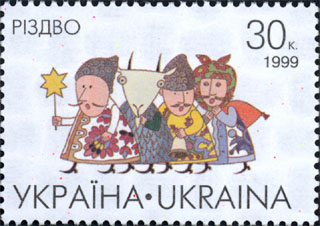Christmas in Ukraine

The Ukrainian Christmas festive days according to the Julian calendar, start on 6 January, Christmas Eve, and end on 19 January, "Jordan" or Epiphany.[1]
Sviaty Vechir (Holy Evening)

Sviata Vecherya or "Holy Supper" is the central tradition of the Christmas Eve celebrations in Ukrainian homes. The dinner table sometimes has a few wisps of hay on the embroidered table cloth as a reminder of the manger in Bethlehem.
Kutia (sweet grain pudding) is traditionally served at the Ukrainian Christmas dinner table. It is often the first dish in the traditional twelve-dish Christmas Eve supper (also known as Svyaty Vechir) and is rarely served at other times of the year.[2]
Koliadky (Caroling)

At the end of the Sviata Vechera the family often sings Ukrainian Christmas carols. In many communities the old Ukrainian tradition of caroling is carried on by groups of young people and members of organizations and churches calling at homes and collecting donations. The Ukrainian song "Shchedryk" became the basis for the world famous Christmas carol, "Carol of the Bells".
Svyatyi Mykolai (Saint Nicholas)

The image of Svyatyi Mykolai as a person who brings the Christmas gifts for children, the feast of which is marked on December 19th. It is supposed, that children should find their Christmas gifts under their pillow on that morning.
Didukh (Grandfather)

When the children see the first Star in the eastern evening sky, symbolizing the trek of the Three Wise Men, the Sviata Vecherya may begin. In farming communities the head of the household now brings in a sheaf of wheat called the didukh which represents the importance of the ancient and rich wheat crops of Ukraine, the staff of life through the centuries. Didukh means literally "grandfather spirit" so it symbolizes the family's ancestors. In city homes a few stalks of golden wheat in a vase are often used to decorate the table.
Shopka (Nativity scene)
This section is empty. You can help by adding to it. (July 2010) |